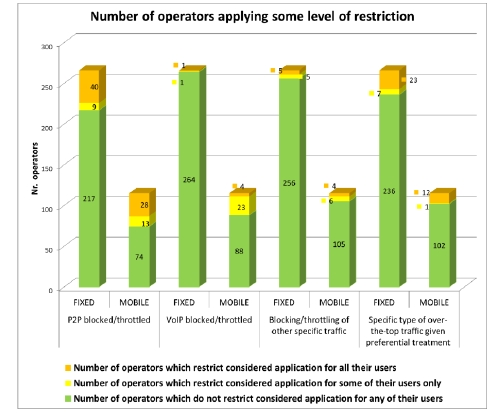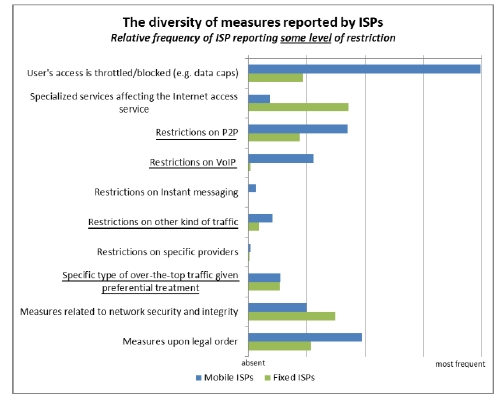At least 20% of mobile Internet users in Europe experience some form of restriction on their ability to access VoIP services, according to a report from BEREC, the European telecoms regulators' body.
The BEREC report, "A view of traffic management and other practices resulting in restrictions to the open Internet in Europe", was compiled in a joint investigation with the European Commission, and was largely based on data submitted by 32 regulators, 266 fixed and 115 mobile operators. A questionnaire asked operators and regulators what traffic management techniques and practices are being applied currently.
The most frequently reported restrictions are the blocking and/or throttling of peer-to-peer (P2P) traffic, on both fixed and mobile networks, and the blocking of Voice over IP (VoIP) traffic, mostly on mobile networks.
As regards P2P, some level of restriction is reported by 49 operators (out of 266) on fixed networks and by 41 operators (out of 115) on mobile networks. As regards VoIP, some level of restriction is reported by 28 operators (out of 115) on mobile networks. Each of these types of restrictions affects at least 20% of subscribers.
Other, less common, examples of specific restrictions (including traffic degradation, i.e. blocking/throttling) are reported. These include restrictions on access to other specific applications (such as gaming, streaming, e-mail or instant messaging service) and, to a much lesser extent, on access to specific content and application providers.
A number of cases of operators giving preferential treatment to specific types of over-the-top traffic were also found (e.g. prioritising streaming and other real-time applications, HTTP, etc.)
 Some examples of special treatment for over-the-top traffic reported by fixed operators are prioritisation of certain kind of traffic or applications at peak times (such as HTTP, DNS, VoIP, gaming, instant messaging, etc.), and assigning lower priority to applications such as file downloading, P2P, etc.
Some examples of special treatment for over-the-top traffic reported by fixed operators are prioritisation of certain kind of traffic or applications at peak times (such as HTTP, DNS, VoIP, gaming, instant messaging, etc.), and assigning lower priority to applications such as file downloading, P2P, etc.
In mobile networks some applications or websites are excluded from the monthly data cap (HTTP traffic, customer care portals or applications such as Facebook).
Full details of the findings are available at this link.
BEREC compiled the traffic management data as part of its work on three draft documents relating to net neutrality that are open to public consultation, with a consultation deadline of 31 July 2012.
The three consultation documents are linked below (links are to PDF downloads).
Guidelines for Quality of Service in the scope of Net Neutrality
An assessment of IP-interconnection in the context of Net Neutrality
Differentiation practices and related competition issues in the scope of Net Neutrality


